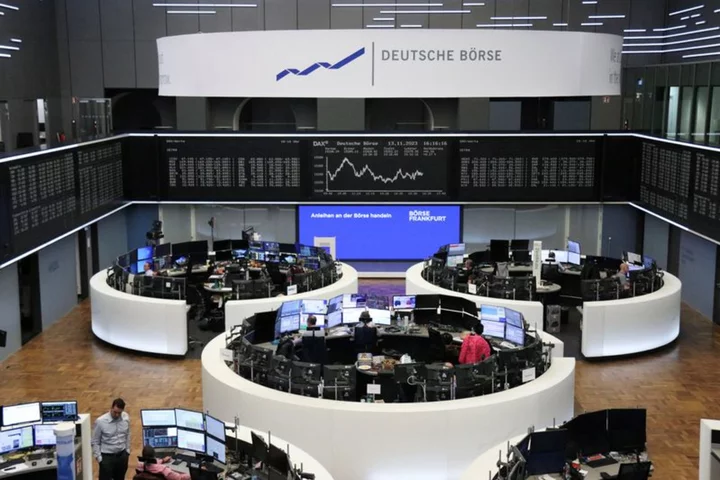By Marc Jones
LONDON World stocks fell for the first time in five sessions, oil slipped and the dollar saw a slight lift on Thursday, as markets continued to assess the prospect of falling interest rates after nearly two years of relentless gains.
Europe's early moves saw the STOXX 600 index dip from a more than one-month high, while Taiwan's dollar rose after China's President Xi Jinping and U.S. counterpart Joe Biden agreed to reinstate key military communications. [.EU]
Global markets have rallied again this week as inflation data out of the United States and parts of Europe like Britain have reinforced hopes that major central banks are now done raising borrowing costs.
Robust U.S. retail sales figures on Wednesday were a reminder that it might not be a straight line move, however, with the focus now on euro zone data due on Friday.
"If you don't get confirmation of the slowing economic direction from every single piece of data every single day we risk running out of momentum on the big trades," Societe Generale FX strategist, Kit Juckes, said.
"Until we get to the point where rate cuts are just around the corner, everything is going to be very stop-start. The dollar selloff is stop-start, the bond market rally is really stop-start and the equity market is all over the place."
Key government bond market borrowing costs resumed their broad downward trend on Thursday driven by an increasing confidence that rate cuts are coming next year.
Germany's 10-year bond yield dipped to 2.62% but held above the previous day's two-month low of 2.568%. [EUR/GVD]
Asian stocks had fallen overnight as new Chinese data showed continued weakness in the country's problem-hit property sector which dented recent optimism about a recovery in the world's second-largest economy.
While data this week showed China's industrial and retail sectors are making a comeback, figures have also shown a sharp drop in property investment and weak home prices, underscoring the ongoing drag the sector is having.
There was mixed news from Japan too, where exports grew for a second straight month in October but at a sharply slower pace due to slumping China-bound shipments of chips and steel.
"The weak economic data from both countries indicate the fact that the global economy is slowing down, highlighting ongoing macro headwinds that businesses face," said Tina Teng, market analyst at CMC Markets.
XI AND BIDEN
Australian shares ended their day down 0.7% as strong wage data indicated that inflationary pressures there were still running high.
Japan's Nikkei dipped 0.3%, moving into reverse after it, along with the main MSCI Asian and emerging market indexes, all posted their biggest gains in a year on Wednesday.
China stocks showed some disappointment at Xi and Biden's first meeting in years, with Shanghai's blue-chip CSI300 index closing down 1% and Hong Kong's Hang Seng index ending 1.3% lower. [.SS]
While the two leaders agreed to resume military-to-military communications and cooperate on anti-drug policies, a sign ties were improving, some investors were disappointed at the lack of other breakthroughs in the talks.
The MSCI main 47-country global stocks index was down for the first time in five sessions after a near 8% surge this month. Wall Street futures pointed to a slightly weaker start. [.N]
Money market traders have now fully priced in that the Federal Reserve will keep U.S. interest rates steady in December. They see the first rate cut of the cycle in May.
The yield on benchmark 10-year Treasury notes was back under 4.5% compared with its U.S. close of 4.537% on Wednesday. The two-year yield hovered at 4.88% compared with a U.S. close of 4.916%.
In currencies, the euro was flat at $1.0848, having gained 2.5% in a month, while the dollar index, which tracks the greenback against a basket of currencies of other major trading partners, was fractionally higher.
Oil traders, meanwhile, nudged U.S. crude down 0.3% to $76.55 a barrel. Brent crude was at $80.90 per barrel while safe-haven gold was slightly higher at $1965 per ounce. [GOL/]
(Additional reporting by Julie Zhu in Hong Kong; Editing by Christina Fincher)

